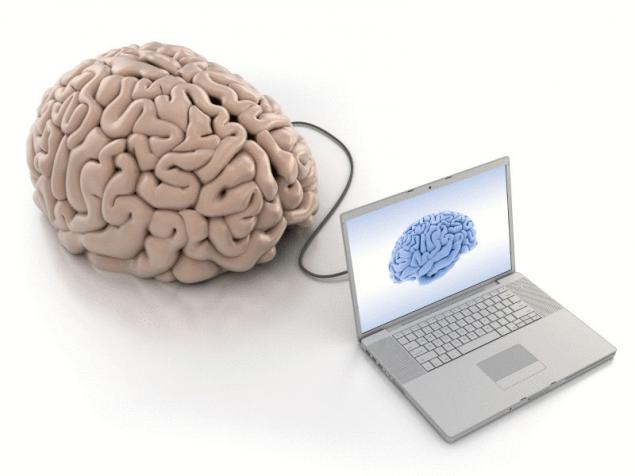488
Technology makes us stupid
Technology is an addiction. It is time to admit it.You can't go a minute without checking messages on iMessages, you always want to see who your friends 'friends put "Like" and check who liked your tweet about the grandmother and the dog, whom you met on the way to work this morning. It is particularly interesting that you can't even remember how you got to this point. There was a time when you watched Jurassic Park on VHS into your Panasonic NV-HV60 in the solitude of my living room, and now using the wonderful capabilities of Google Glass your dirty little sex parties can see at any point of the planet in real time.

We live in a world where thinking is not a prerequisite for something to do. Opinions, facts, and locations of anything you can just find on the Internet, without putting superefforts. This real-life dystopia where stumbling across absolute mindless shit like this, much easier than to talk to a real person on the phone. Everything we do online and offline, is recorded, distributed, and tracked, for the gain of world-devouring corporations who want to turn you into a battery for their giant vibrator.
The book "the Glass cage" (TheGlassCage) Nicholas Carr ("one of the most demanding vdumchivy now living thinkers," according to Jonathan SAFRAN Foer) just about it. Exploring our existence, which becomes more and more dependent on technology and automation (for you who is thinking that Google will find the answer to any question; the GPS will show where your own apartment, a taxi that does not require human control), this book reveals some disturbing effects of such an addiction, such as loss of aircraft control skills, for example. Or want to see a future where everyone has a machine that makes the perfect spaghetti Bolognese, but no one knows how to cook it yourself (I might be able to do)?
I tracked Carr to talk to him about how it happened that we became so dependent, and what can be done to stop it.
To blame the Internet?
Nicholas Carr: It provides the convenience and Foundation of everything else, we cannot say that he is to blame.
But the Internet still has a big impact?
I think he's manipulating us to become less patient. We have less to weed out low-quality information, although becoming better at gathering information.
How we interact with computers influences how we think?
If you are constantly working with computers, then your brain will optimize itself for gathering and following received by computers of the information. The brain begins to lose some of the subtle features that we will use in the real communication and the real world.
How technology changed you?
The basis of the book was the understanding that in a very short period of time, we have to rely on computers to do most of the things we actually do. We very quickly got used. In human history there was a certain balance between the actions that a person did himself, and the actions that were performed with the use of technology. Now computers as the technology involved in our lives at this level as previously, no technology was used.
Is it possible to distinguish between the physical and virtual worlds?
Was an interesting experiment done with mice.
Mouse and here lit.
Scientists monitored the brains of mice as they navigated a real maze, and then when they moved through the maze, modeled with the use of computer technology. The researchers found that the brain activity of mice was significantly reduced when mice were moved through the simulation.
How do you feel about such apps as Freedom and Moment that are on the computer or phone, but is primarily intended to prevent you from using your computer or phone?
It looks like the creation of the software aimed at solving the problem that the software created. Our own will is somehow insufficient to deal with it.
So, we are all idiots.
But on the other hand, I'm reassuring. This shows that there are people who think and understand that this goes too far...
It seemed to me that human nature is always trying to invent something that will make life easier. Unless each of us deep down don't want to lie on the big sofa with lots of food?
That's an interesting theory, which he called the paradox of work.
What do you mean?
Deep in our psyche there is a belief that we will be lucky if we will not do anything and therefore we always aim to do less than you could do. But in fact this approach makes us unhappy. We believe we will be happier and more fulfilled if we don't work, but it turns out that we get the most pleasure when I work.
Wow.
This explains why we are so quick and easy to get used to the technology. Airplanes are a good example of why it's bad. In this case technology contribute to the degradation of skill. When disasters occur, people tend to blame it on human error, but actually the human error-induced excessive dependence on technology.
I agree. Besides, not last role is played by social media in the modern world.
The problem is not in social media. The problem is that we have become very dependent on the Internet as the main source for gathering information, now we take information only from the Internet. Ultimately, technology reflects the way a person thinks, in fact this is reminiscent of the work of the computer, all the brain work focused on processing and utilization of information.
Thus, we all become computers. Yeah, not fun.
No, I think most people on this planet would make pretty rubbish computers, thank God. But I am concerned that instead of trying to find the balance, we're simply saying, "Let the computer do it."
Now we can almost all the way up to designing your pizza вDomino'spizzaс Google. They claim to have created all-knowing Artificial intelligence. It's true, do you think?
The main problem is that the algorithms that work remain invisible to us. Just because Google is working very fast, we believe that it gives the best result. We are being manipulated in the question of what information to give us.
There is a universal view that the technologies that we use are the best. But it's not. There are different types of interests: economic, social, and even military, so we get what is dictated by these interests.
At the beginning of automation, there were two options: the first, when the software was created by the managers and given to the employee to use, and second, when it was recognized that the employee has all the skills and knowledge, and the employee is given the opportunity to automate processes. Guess which version won.
You want to say that we are very naive to the intentions of Google?
Largely such companies are driven by their economic interests, and it is in their economic interest to we were more distracted, sitting on the Internet, showing you ads. The faster they can force you to move from page to page, the more effective their economic business model, so you can collect more information to show you more paid ads.
But if their ultimate goal is the creation of Artificial intelligence, and they Finance this by creating a system that diverts, provides instant results, and then writes it turns out, their image of a real person is distorted, isn't it?
Overall, I agree, you're right, but I'm a little about what I wanted to say. For the creation of Artificial intelligence used by the economic interest of the company, as well as the model of human behavior on the Internet, which is actually not such a one-sided and in reality is much more diverse.
It turns out that we will create a system that will be able to provide my very low desire: porn, pizza, pop culture. What is the probability that Google knows my preferences in porn?
Very high.
Should we fear the future?
I think we need to think about the future. We are putting ourselves passively into the hands of those who design the systems. We need to think critically about the fact that even if we keep our enthusiasm and desire for great inventions, they will be implemented. I'm not a Luddite. I don't think we should trash our laptops and run off into the woods.
We mainly proceed from Freud's conception of death, we do everything possible to make himself lifeless organisms.
Even before Freud, Marx expressed the opinion that in the pursuit of new technology lies an unconscious desire to create odusevljen technology with real life and inanimate people. If you look at the first radio, you will see that there is a device for receiving and transmitting information, but now most people have ceased to transmit information, and began to just listen and accept it.
Are we destined to invent a technology which, ultimately, will kill us?
I am opposed to this idea. As I wrote at the end of his Glass cage, I believe that technology deepens our relationship with the world. Like the telescope. We're horrible knives for grass without reason. It is a terrible tool. But the clock is ticking the clock is ticking...
Please don't say the clock is evil.
It's a double-edged sword. I cautiously say on this subject, so as not to sound like a person who condemns hours, as a measure of time.
I promise that this will not happen.
Well. Clocks transformed time from a flow into precisely measurable units, which was absolutely essential for industrialization. But this does not mean that when you become completely acclimated to the clock, you lose the natural feeling of flow of time. We are accustomed to the routine over time, we get up at X o'clock, we go to work at Y o'clock, we go to bed at Z o'clock.
Clear. Are there any good modern invention?
Mmmm.
No?
The stairs? They are good.
I'm not saying ladders are rubbish. But I would not say that this is a modern invention. How about a pogo stick?
For me it is something akin to a telescope. But if someone is planning to spend all day on these stilts, it's not a good idea. I'm in this category also applies to DJ mixset as a tool for creation. Digital recording technology, too.
Plan to pursue quiet contemplation?
I hope so. published
Author: David Whelan
P. S. And remember, only by changing their consumption — together we change the world! ©
Source: www.vice.com/ru/read/machines-are-making-us-all-stupid

We live in a world where thinking is not a prerequisite for something to do. Opinions, facts, and locations of anything you can just find on the Internet, without putting superefforts. This real-life dystopia where stumbling across absolute mindless shit like this, much easier than to talk to a real person on the phone. Everything we do online and offline, is recorded, distributed, and tracked, for the gain of world-devouring corporations who want to turn you into a battery for their giant vibrator.
The book "the Glass cage" (TheGlassCage) Nicholas Carr ("one of the most demanding vdumchivy now living thinkers," according to Jonathan SAFRAN Foer) just about it. Exploring our existence, which becomes more and more dependent on technology and automation (for you who is thinking that Google will find the answer to any question; the GPS will show where your own apartment, a taxi that does not require human control), this book reveals some disturbing effects of such an addiction, such as loss of aircraft control skills, for example. Or want to see a future where everyone has a machine that makes the perfect spaghetti Bolognese, but no one knows how to cook it yourself (I might be able to do)?
I tracked Carr to talk to him about how it happened that we became so dependent, and what can be done to stop it.
To blame the Internet?
Nicholas Carr: It provides the convenience and Foundation of everything else, we cannot say that he is to blame.
But the Internet still has a big impact?
I think he's manipulating us to become less patient. We have less to weed out low-quality information, although becoming better at gathering information.
How we interact with computers influences how we think?
If you are constantly working with computers, then your brain will optimize itself for gathering and following received by computers of the information. The brain begins to lose some of the subtle features that we will use in the real communication and the real world.
How technology changed you?
The basis of the book was the understanding that in a very short period of time, we have to rely on computers to do most of the things we actually do. We very quickly got used. In human history there was a certain balance between the actions that a person did himself, and the actions that were performed with the use of technology. Now computers as the technology involved in our lives at this level as previously, no technology was used.
Is it possible to distinguish between the physical and virtual worlds?
Was an interesting experiment done with mice.
Mouse and here lit.
Scientists monitored the brains of mice as they navigated a real maze, and then when they moved through the maze, modeled with the use of computer technology. The researchers found that the brain activity of mice was significantly reduced when mice were moved through the simulation.
How do you feel about such apps as Freedom and Moment that are on the computer or phone, but is primarily intended to prevent you from using your computer or phone?
It looks like the creation of the software aimed at solving the problem that the software created. Our own will is somehow insufficient to deal with it.
So, we are all idiots.
But on the other hand, I'm reassuring. This shows that there are people who think and understand that this goes too far...
It seemed to me that human nature is always trying to invent something that will make life easier. Unless each of us deep down don't want to lie on the big sofa with lots of food?
That's an interesting theory, which he called the paradox of work.
What do you mean?
Deep in our psyche there is a belief that we will be lucky if we will not do anything and therefore we always aim to do less than you could do. But in fact this approach makes us unhappy. We believe we will be happier and more fulfilled if we don't work, but it turns out that we get the most pleasure when I work.
Wow.
This explains why we are so quick and easy to get used to the technology. Airplanes are a good example of why it's bad. In this case technology contribute to the degradation of skill. When disasters occur, people tend to blame it on human error, but actually the human error-induced excessive dependence on technology.
I agree. Besides, not last role is played by social media in the modern world.
The problem is not in social media. The problem is that we have become very dependent on the Internet as the main source for gathering information, now we take information only from the Internet. Ultimately, technology reflects the way a person thinks, in fact this is reminiscent of the work of the computer, all the brain work focused on processing and utilization of information.
Thus, we all become computers. Yeah, not fun.
No, I think most people on this planet would make pretty rubbish computers, thank God. But I am concerned that instead of trying to find the balance, we're simply saying, "Let the computer do it."
Now we can almost all the way up to designing your pizza вDomino'spizzaс Google. They claim to have created all-knowing Artificial intelligence. It's true, do you think?
The main problem is that the algorithms that work remain invisible to us. Just because Google is working very fast, we believe that it gives the best result. We are being manipulated in the question of what information to give us.
There is a universal view that the technologies that we use are the best. But it's not. There are different types of interests: economic, social, and even military, so we get what is dictated by these interests.
At the beginning of automation, there were two options: the first, when the software was created by the managers and given to the employee to use, and second, when it was recognized that the employee has all the skills and knowledge, and the employee is given the opportunity to automate processes. Guess which version won.
You want to say that we are very naive to the intentions of Google?
Largely such companies are driven by their economic interests, and it is in their economic interest to we were more distracted, sitting on the Internet, showing you ads. The faster they can force you to move from page to page, the more effective their economic business model, so you can collect more information to show you more paid ads.
But if their ultimate goal is the creation of Artificial intelligence, and they Finance this by creating a system that diverts, provides instant results, and then writes it turns out, their image of a real person is distorted, isn't it?
Overall, I agree, you're right, but I'm a little about what I wanted to say. For the creation of Artificial intelligence used by the economic interest of the company, as well as the model of human behavior on the Internet, which is actually not such a one-sided and in reality is much more diverse.
It turns out that we will create a system that will be able to provide my very low desire: porn, pizza, pop culture. What is the probability that Google knows my preferences in porn?
Very high.
Should we fear the future?
I think we need to think about the future. We are putting ourselves passively into the hands of those who design the systems. We need to think critically about the fact that even if we keep our enthusiasm and desire for great inventions, they will be implemented. I'm not a Luddite. I don't think we should trash our laptops and run off into the woods.
We mainly proceed from Freud's conception of death, we do everything possible to make himself lifeless organisms.
Even before Freud, Marx expressed the opinion that in the pursuit of new technology lies an unconscious desire to create odusevljen technology with real life and inanimate people. If you look at the first radio, you will see that there is a device for receiving and transmitting information, but now most people have ceased to transmit information, and began to just listen and accept it.
Are we destined to invent a technology which, ultimately, will kill us?
I am opposed to this idea. As I wrote at the end of his Glass cage, I believe that technology deepens our relationship with the world. Like the telescope. We're horrible knives for grass without reason. It is a terrible tool. But the clock is ticking the clock is ticking...
Please don't say the clock is evil.
It's a double-edged sword. I cautiously say on this subject, so as not to sound like a person who condemns hours, as a measure of time.
I promise that this will not happen.
Well. Clocks transformed time from a flow into precisely measurable units, which was absolutely essential for industrialization. But this does not mean that when you become completely acclimated to the clock, you lose the natural feeling of flow of time. We are accustomed to the routine over time, we get up at X o'clock, we go to work at Y o'clock, we go to bed at Z o'clock.
Clear. Are there any good modern invention?
Mmmm.
No?
The stairs? They are good.
I'm not saying ladders are rubbish. But I would not say that this is a modern invention. How about a pogo stick?
For me it is something akin to a telescope. But if someone is planning to spend all day on these stilts, it's not a good idea. I'm in this category also applies to DJ mixset as a tool for creation. Digital recording technology, too.
Plan to pursue quiet contemplation?
I hope so. published
Author: David Whelan
P. S. And remember, only by changing their consumption — together we change the world! ©
Source: www.vice.com/ru/read/machines-are-making-us-all-stupid























